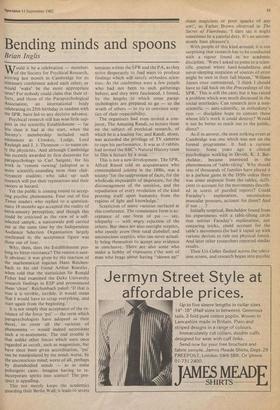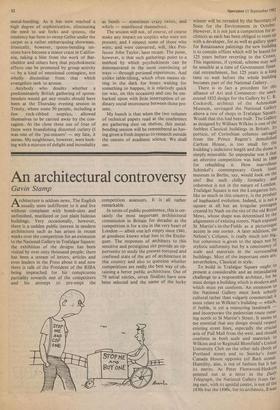Bending minds and spoons
Brian Inglis
ould it be a celebration — members of the Society for Psychical Research, arriving last month in Cambridge for its centenary conference asked each other; or would 'wake' be the more appropriate term? For nobody could claim that their ef- forts, and those of the Parapsychological Association, an international body celebrating its 25th birthday in tandem with the SPR, have led to any decisive advance. Psychical research still has won little sup- Port in the scientific Establishment — far less than it had at the start, when the Society's membership included such eminences as Crookes, Lodge, Lord Rayleigh and J. J. Thomson — to name on- ly the physicists. And although Cambridge has recently awarded its first doctorate for parapsychology to Carl Sargent, for his work in `remote viewing' (adopted as a more scientific-sounding term than clair- voyance) students who take up such research still put their reputations and their careers at hazard.
Yet the public is coming round to accep- ting psychic phenomena. Four out of five Times readers who replied to a question- naire 18 months ago accepted the reality of extra-sensory perception; and though this Could be criticised as the view of a self- selected sample, a nationwide poll carried out at the same time by the Independent Audience Selection Organisation largely confirmed it; the acceptance figure was three out of four.
Why, then, does the Establishment pro- long its bitter resistance? The reason is sure- ly obvious: it was given by the reaction of the mathematical logician Hans Reichen- bach to his old friend Arthur Koestler, when told that the statistician Sir Ronald Fisher had examined the Duke University research findings in ESP and pronounced them `clean'. Reichenbach paled: `If that is true it is terrible, terrible. It would mean that 1 would have to scrap everything, and start again from the beginning.'
It is, not simply that acceptance of the ex- istence of the force `psi' — the term which Parapsychologists have adopted as their duvet, to cover all the varieties of phenomena — would indeed necessitate such a re-assessment. The real trouble is that unlike other forces which were once regarded as occult, such as magnetism, but have since been given accreditation, `psi' can be manipulated by the mind; worse, by the unconscious mind; worst of all, perhaps by disembodied minds — as in some Poltergeist cases. Imagine having to re- incorporate spirits into science! The pro- spect is appalling.
This not merely keeps the academics guarding their Berlin Wall; it leads to severe tensions within the SPR and the PA, as they strive desperately to find ways to produce findings which will satisfy orthodox scien- tists. At the conference were a few people who had not been to such gatherings before; and they were fascinated, I found, by the lengths to which some parap- sychologists are prepared to go — to the wrath of others — to try to convince scep- tics of their respectability.
The organisers had even invited a con- juror, The Amazing Randi, to lecture them on the subject of psychical research, of which he is a leading foe; and Randi, alone, was accorded the privilege of TV cameras to tape his performance. It was as if rabbits had invited the BBC's Natural History team to film a lecture by a stoat.
This is not a new development. The SPR, Alfred Russel told an acquaintance who contemplated joining in the 1890s, was a society `for the suppression of facts, for the wholesale imputation of imposture, for the discouragement of the sensitive, and the repudiation of every revelation of the kind pressing itself upon humanity from the regions of light and knowledge.'
Scepticism of many varieties surfaced at this conference. The commonest form is ac- ceptance of one form of psi — say, telepathy — with angry rejection of the others. But there are also outright sceptics, who openly avow their total disbelief; and unconscious sceptics, who can never actual- ly bring themselves to accept any evidence as conclusive. There are also some who make a hobby of exposures (`the sort of man who brags about having "shown up"
sham magicians or poor quacks of any sort', as Father Brown observed in The Secret of Flambeau; `I dare say it might sometimes be a painful duty. It's an uncom- monly base pleasure').
With people of this kind around, it is not surprising that research has to be conducted with a rigour found in no academic discipline. `Were I asked to point to a scien- tific journal where hard-headedness and never-sleeping suspicion of sources of error might be seen in their full bloom,' William James once commented, '1 think I should have to fall back on the Proceedings of the SPR.' This is still the case; but it has raised a problem which was much discussed in the social interludes.. Can research into a non- scientific — anti-scientific, in orthodoxy's eyes — discipline hope to convert those whose life's work it could destroy? Would it not be better to reach out to the public, direct?
As if in answer, the most striking event at Cambridge was one which was not on the formal programme. It had a curious history. Some years ago a clinical psychologist working in Devon, K. J. Bat- cheldor, became interested in the phenomenon of `table-tilting'. Why should tens of thousands of families have played it as a parlour game in the 1850s unless there was some response from the tables, suffi- cient to account for the movements describ- ed in scores of puzzled reports? Could Faraday's explanation, unconscious muscular pressure, account for them? And if not ...?
Initially sceptical, Batcheldor found from his experiments with a table-tilting circle that neither Faraday's explanation, nor conjuring tricks, could account for the table's movements (he had it taped up with various devices to rule out physical force). And later other researchers reported similar results.
Then Uri Geller flashed across the televi- sion screen, and research began into psychic metal-bending. As it has now reached a high degree of sophistication, eliminating the need to use forks and spoons, the tendency has been to sweep Geller under the carpet as a rather embarrassing showman. Ironically, however, spoon-bending ses- sions have become a minor craze in Califor- nia, taking a hint from the work of Bat- cheldor and others here that psychokinetic effects can be promoted by group activity — by a kind of emotional contagion, not wholly dissimiliar from that which evangelists seek to arouse.
Anybody who doubts whether a predominantly British gathering of spoon- benders would get any results should have been at the Thursday evening session in Trinity, where some 50 people, including a few rock-ribbed sceptics, allowed themselves to be carried away by the con- tagion. At the close three out of four of them were brandishing distorted cutlery (I was one of the 'psi-missers' — my fate, it seems. My neighbours, however, were look- ing with a mixture of delight and incredulity as bends — sometimes crazy twists, and whirls — manifested themselves).
The session will not, of course, of course make any impact on sceptics who were not present; and I suspect some of those who were, and were converted, will, like Pro- fessor John Taylor, later recant. The point, however, is that such gatherings point to a method by which psychokinesis can be demonstrated in the most convincing of ways — through personal experiences. And unlike table-tilting, which often means sit- ting in the dark for hours waiting for something to happen, it is relatively quick (or was, on this occasion) and can be em- barked upon with little interruption of or- dinary social intercourse between those pre- sent.
My hunch is that when the two volumes of technical papers read at the conference are gathering dust on shelves, this metal- bending session will be remembered as hav- ing given a fresh impetus to research outside the canons of academic science. We shall see.



































 Previous page
Previous page